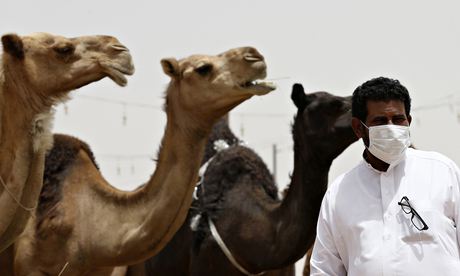
Health authorities on Monday issued a new warning in relation to a deadly virus which has killed more than a hundred people in the Middle East by urging UK-based travellers to avoid contact with camels in the region and contact their GP on their return if they exhibit related symptoms.
The warning was issued after a second case of the Middle East respiratory syndrome (Mers) virus was identified in someone who had transited through London on a flight from Saudi Arabia to the US and is broader in scope than one last week which was aimed just at passengers on the same flight.
No other passenger from that flight were found to have the virus, according to Public Health England, which carried out tests.
It issued its new guidance on Monday after a person found to have Mers was identified as having been a passenger on Saudi Airlines flight 113 from Jeddah to London, and who had transferred at Heathrow for onward travel on 1 May.
Professor Nick Phin, head of respiratory diseases for Public Health England, said: "Any UK-based travellers who become unwell with a fever, cough or shortness of breath within 14 days of being in the Middle East, should make sure they call their doctor and tell them where they have travelled.
"Although the source of Mers-CoV is currently unknown, there is growing evidence of the possible role of camels in transmitting Mers-CoV to humans. We advise travellers, particularly those with underlying or chronic medical conditions, to avoid contact with camels in the Middle East. All travellers should practice good hand and respiratory hygiene to reduce the risk of respiratory illness."
Phin added: "Although the source of Mers-CoV is currently unknown, there is growing evidence of the possible role of camels in transmitting Mers-CoV to humans. We advise travellers, particularly those with underlying or chronic medical conditions, to avoid contact with camels in the Middle East. All travellers should practice good hand and respiratory hygiene to reduce the risk of respiratory illness."
As with the incident earlier this month, Phin said that the risk is very low but added that health authorities would again be following up with any UK passengers who were sitting in the vicinity of the passenger with Mers.
The period between exposure and when symptoms might develop for Mers-CoV is currently considered to be up to 14 days, according to Public Health England, which added that any illness that passengers might experience more than 14 days after the flight ( starting on or after Wednesday 14 May) would not be considered to be related.
Saudi Arabia has been the centre of an outbreak of Mers that began about two years ago, infecting at least 400 people worldwide and killing more than 100. Mers belongs to the coronavirus family that includes the common cold and Sars, or severe acute respiratory syndrome, which caused some 800 deaths globally in 2003.
US health authorities said on Monday that the traveller who had passed through London en route to the US on 1 May was the second "imported" instance of Mers, and was being dealt with by healthcare authorities in Florida.
The first such imported case involved a US healthcare worker who lives and works in Saudi Arabia and had flown earlier this month from Riyadh to London and then Chicago, before boarding a bus to Highland, Indiana. He then began experiencing symptoms of fever, shortness of breath, and sought care at a hospital in Indiana. The patient is now clear of the virus and was released on Friday.

